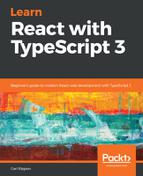The final tuple enhancement in TypeScript 3 is the ability to have optional elements. Optional elements are specified using a ? at the end of the element type.
Let's look at another example using our scores theme:
- Let's create a type for between one and three scores:
type Scores = [number, number?, number?];
- So, we should be able to create variables to hold between one and three scores:
const samScores: Scores = [55];
const bobScores: Scores = [95, 75];
const jayneScores: Scores = [65, 50, 70];
As expected, this compiles just fine.
- What about four elements? Let's give this a go:
const sarahScores: Scores = [95, 50, 75, 75];
We get a compilation error, as we would expect:

- If we try no elements, we again get a compilation error:
const benScores: Scores = [];
When defining optional elements in a tuple, they are restricted to the end of the tuple. Let's try to define a required element after an optional element:
type ProblematicScores = [number?, number?, number];
We get a compilation error, as expected:

Optional elements also work in a function rest parameter. Let's try this:
- Let's use our scores type in our logScores function we worked with in earlier sections:
type Scores = [number, number?, number?];
function logScores(...scores: Scores) {
console.log(scores);
}
- If we try to pass in two scores, the code will compile just fine, because the last parameter is optional:
logScores(45, 80);
- As expected, if we pass in four scores, we receive Expected 1-3 arguments, but got 4:
logScores(45, 70, 80, 65);
When we have optional parameters, it is likely our function's implementation will need to know which arguments have been passed. We can use the tuple's length property to do this:
- Let's create an enhanced version of our scores logger, called logScoresEnhanced, which thanks us if we log all 3 scores:
type Scores = [number, number?, number?];
function logScoresEnhanced(...scores: Scores) {
if (scores.length === 3) {
console.log(scores, "Thank you for logging all 3 scores");
} else {
console.log(scores);
}
}
- Now, let's call this function with various parameters:
logScoresEnhanced(60, 70, 75);
logScoresEnhanced(45, 80);
logScoresEnhanced(95);
If we run the program, we only get thanked after the first call when we pass all three scores.
All the enhancements to tuples in TypeScript 3 allow us to use the rest and spread syntax in a strongly-typed fashion. We'll make use of this feature later in the book, when we work with React components.
